- Home
- David Pilling
Flame of the West
Flame of the West Read online
CAESAR’S SWORD (III): FLAME OF THE WEST
By David Pilling
More Books by David Pilling
The Half-Hanged Man
The White Hawk (I)
The White Hawk (II): Rebellion
The White Hawk (III): Restoration
Caesar’s Sword (I): The Red Death
Caesar’s Sword (II): Siege of Rome
Robin Hood (I)
Robin Hood (II): The Wrath of God
Robin Hood (III): The Hooded Man
Nowhere Was There Peace
The Best Weapon (with Martin Bolton)
Sorrow (with Martin Bolton)
The John Swale Chronicles
Folville’s Law & 12 mini-sequels
Follow David at his blogs at:
www.pillingswritingcorner.blogspot.co.uk
www.davidpillingauthor.com
http://www.boltonandpilling.com
Or contact him direct at:
[email protected]
Map of Italy c.6th century AD
1.
Abbey of Rhuys, Brittany, 571 AD
No father should have to bear the loss of his son. Of all the cruelties and hardships God saw fit to heap upon my head, this was the worst.
Abbot Gildas, who knows something of my history, sometimes asks to join me in praying for the soul of Arthur. He does not know I pray for my son’s wellbeing, not his soul.
I last set eyes on him almost twenty years ago, near the banks of the Po in northern Italy. If I shut my eyes, I can picture him clearly: a tall, proud, soldierly figure, with his mother’s wiry frame and the flaming red hair of his royal British ancestors. He rode as well as any Scythian or Hunnish horse-archer, and Caledfwlch gleamed in his hand.
“Go!” I screamed, pointing my spear west, towards the distant border of Liguria, “go now, or bear a father’s curse!”
Arthur might have disobeyed, for he was ever a strong-willed brute, but he carried a sacred charge. Caesar’s sword, wielded by his famous ancestor (and namesake) at Mount Badon, could not fall into the hands of our enemies. I had made him swear an oath to that effect, and taught him to keep his oaths.
Our eyes met for the last time. His were green, so much like his mother’s, and blazing with fury. It was against his proud nature to turn and run, but there was no help for it.
The thunder of hoofs sounded behind us. I twisted my neck and saw the dark shapes of horsemen thundering across the plain to the south. A dozen at least, Frankish lancers in gleaming mail and white cloaks.
They had been pursuing us for days, remorseless as hounds after a couple of fleeing deer. I tried every trick I knew to evade them, but the Frankish captain was no fool, and saw through all my deceptions.
I glanced back at Arthur. To my relief, he had obeyed my last instruction, and was riding away to the west at the gallop. We had fled with remounts, and ridden the first pair of horses to exhaustion, but his fresh mount would carry him over the border to safety.
He urged his horse up to the crest of a little ridge, and there halted and wheeled her about. For a moment his superb cavalry figure was silhouetted against a backdrop of rolling hills and the light of the rising sun, Caledfwlch raised high in salute. The length of the blade rippled with silvery light, as it had done in the caves on the shore of Amorica, so many years ago.
“Virtus et fortitudo!” I heard him shout: ‘Courage and strength’, the old battle-cry of the legions. My eyes misted as I recalled the first time Arthur heard it, chanted by a phalanx of Isaurian spearmen marching on parade along the Mese in Constantinople.
Then he was gone, vanished behind the ridge, and the light of Caledfwlch snuffed out.
I dragged my horse around to face the Franks. They were coming on at the charge, triumphant war-shouts tearing through the still air. It was Caledfwlch they wanted, not me, but I would die rather than let them slay my son and deliver Caesar’s sword into the hands of a barbarian king.
Blinking away tears, I urged my horse straight at the Franks, aiming for their captain. He was a typically burly officer, his auburn hair twisted into pigtails, face partially hidden behind the nose-guard and hinged cheek-pieces of an elaborate golden helm.
“Belisarius!” I shouted as I surged in for the kill, the name of my old chief rising in my throat. I had not shouted his name in many years, and would never see or serve under him again. Despite everything, all the bitterness and disappointment he had caused me, I still honoured the man.
The Franks spread out to encircle me. I ignored them and cast my spear at their leader. It was a good throw, and pierced his right shoulder, just above where a silver brooch held his cloak in place. The impact made him jerk in the saddle, and his horse came to grief, her legs tangling and folding up under her.
His men screeched in rage and closed in around me. I dragged back on my reins with one hand and reached for my spatha – a poor substitute for Caledfwlch – with the other.
A spear clanged against the shield strapped to my left arm. I bit back a spurt of pain, tore the blade free and turned to face the nearest Frank as he came plunging at me, axe raised high.
At fifty-one, my reflexes had lost their edge. I tried to lean sharply to my left to avoid the blow, but was too slow. The edge of his axe slammed into my breast. It split the mail, drove the breath from my body, and hurled me backwards out of the saddle.
Red blotches flashed before my eyes. The world spun crazily. My horse bucked and shrieked in panic. I landed with a jarring thump on my back.
I tried to rise, but a dark shadow fell over me, and flailing hoofs crunched into my ribs, my pelvis, my spine. One of the Franks had ridden his horse straight over me.
Pain, and numbing despair. I lay curled like a worm on the end of a hook, unable to move, scarcely able to breathe. Waiting for the blow that would finish me, and usher my shade into the next world.
It didn’t come.
2.
I am ahead of my tale, and must go back some thirteen years, to the coast of Naples. There, along with Procopius and a few other companions, I saw the Roman fleet anchored in the glittering blue waters of the bay.
We had crept out of Rome, on the orders of Belisarius, to make our way through the Gothic siege lines and hence to Campania, to try and raise reinforcements from our scattered garrisons.
Procopius let out a cry of joy when he sighted the fleet. The troops from Constantinople were so long-delayed we had despaired of them ever arriving, and he was of the opinion that the Emperor Justinian had abandoned his army in Italy to its fate. Procopius always held a low opinion of Justinian, and those unfortunate enough to read his Secret History (as I have) will know how his dislike of the emperor eventually congealed into madness.
He had to swallow his bile on this occasion, and clawed at my arm in excitement as he watched the soldiers disembarking in the harbour. They were Isaurians, tough infantry from the rugged hill country near the borders of Cilicia.
“Look to the south,” he cried, stabbing his finger at a point further down the coast, beyond the city. I strained my eyes to see, and thought I made out a thin column of dust. Then I caught the flash of sunlight on spear-heads.
“More reinforcements?” I said. He nodded vigorously, his oversized head wobbling on the end of its skinny neck.
“Must be,” he replied, lifting himself awkwardly into the saddle, “let us go down and meet them.”
I fetched my horse from where I had tethered her, and together – there were eight of us in all, including six Hunnish warriors and a native Roman who had guided us through the Gothic lines – we rode down the coast road, skirting the white walls of Naples and heading south-east, towards the advancing trail of dust.
The banners of Roman cavalry soon b
ecame visible. They turned out to be a mixture of Huns and Scythians and Heruls, two thousand men in all. Having made landfall at Otranto on the southern Italian coast, they had force-marched across Campania to meet the rest of the Roman reinforcements at Naples.
We learned as much from their commander, a nobleman named John the Sanguinary. You will gather from his name what kind of man he was. I had known many hard, bloodthirsty officers in the Roman army, such as Bessas and John Troglita and Constantine, but John the Sanguinary beat them all.
The son of Vitalian, a treacherous general who had rebelled against the Emperor Anastasius and was finally murdered by Justinian, he lived under the shadow of his father’s accursed memory. Constantly under suspicion, constantly aware of Justinian’s displeasure, he had somehow survived to adulthood and looked to forge a career in the army.
If I had known how much trouble this man would cause me, and the Roman cause in general, I might have thrust Caledfwlch into his heart. As it was, I respectfully saluted the tall, leathery-skinned nobleman, and listened while he spoke with Procopius.
Belisarius’ secretary was not the sort to defer to anyone, but even he seemed overawed by John’s languid, aristocratic air, and (most unusually for him) made an effort to listen instead of dominating the conversation.
“Ye-es,” John drawled after Procopius had provided a hasty explanation of how we had escaped from Rome, “so General Belisarius is still shut up inside the city, is he? I feared as much. The general is a decent strategist, but rather too cautious.”
I was eating while he spoke, and almost choked on a bit of dried meat. Belisarius had risked his own life many times during the siege of Rome, and performed wonders in defending the city against obscene odds. This arrogant, perfumed young noble, in his rustling silks and polished lamellar armour, knew nothing of the hardships of war.
No-one heeded my spluttering. “I have studied the approaches to Rome,” said John, shading his eyes to study the fleet bobbing at anchor in bay, “and I believe the garrison still retains control of Ostia, am I correct?”
Ostia was the main harbour with access to Rome, about twenty miles northeast of the city.
“Yes,” replied Procopius, “but the Goths have seized the Portus Claudii. Thus we cannot get supplies into Rome via the sea.”
John gave a limp little flick of his gloved hand. “Then the supply wagons will travel up the Appian Way,” he said, “escorted by our cavalry. If they are attacked, the men can dismount and the wagons form into squares. A mobile fortress, yes?”
It was an original idea, and I started to wonder if John was something of a soldier after all. Our last detachment of reinforcements had reached Rome via Ostia, and he had the same notion.
We did not advance north immediately, but marched to Naples. I had no sooner found a billet than Procopius insisted I ride out with him, to look for more reinforcements.
Knowing my duty, though resenting it, I consented to be dragged all over Campania. The secretary was seized with one of his periodic bouts of furious energy, and in the space of two or three days managed to raise some three hundred men from various occupied towns and villages.
“Not a bad tally,” he said as we cantered back towards Naples, exhausted from our labours, “we might have levied more, but it is dangerous to strip the countryside of troops. I don’t trust the Italians. They need the presence of armed men to remind them of their loyalty to Rome.”
“But they are Romans,” I protested, “this is the heartland of the old Western Empire. Surely they regard our arrival as a deliverance?”
This was a point I had never fully grasped, and Procopius smiled thinly as he explained it to me.
“The Romans have done very well under the rule of the Gothic kings,” he said, “far better than under the latter-day Caesars. Between you and me, Coel, the later Western Emperors were a pack of idiots. They threw away their empire with both hands. Rome, and Italy, have prospered since Alaric deposed the last Emperor and sent his regalia to Constantinople.”
I glanced nervously at the line of horsemen behind us. At least a quarter of them were native troops, volunteers who had flocked to our banner.
“It is a hard thing, to submit to foreign conquest,” I said, “even if the rule of the conquerors is beneficial.”
I was thinking of Britain, the homeland I had not seen since childhood, and wondering who held dominion over her now.
After my grandsire’s death, the land had collapsed into a patchwork of petty feuding kings and chieftains, like so many cockerels fighting over a dungheap. Perhaps another strong man had emerged from the chaos, to seize power for a time. Or perhaps the invading Saxons and their foul kin had overwhelmed the fragmented British kingdoms and made the land their own. Whatever the state of affairs, I had little doubt the mass of the people lived in abject misery, taxed and herded into battle by their native rulers, slaughtered and enslaved by the invaders.
Sometimes I entertained impossible dreams of returning to Britain at the head of an army and rescuing my country. Restoring good government and order, expelling the barbarians, and uniting the land under a High King. I even pictured myself seated on the throne, robed in purple and cloth of gold like Justinian, Caledfwlch gleaming at my hip, and all the proud lords of Britain kneeling before me.
Fond dreams, for an ageing ex-charioteer and thoroughly mediocre junior officer in the Roman army. I was unlikely to see Britain again, or live much longer. Somehow, through various twists of fate, I had contrived to offend powerful and dangerous people, including the Empress Theodora, her friend Antonina, and the scheming eunuch Narses. It was only thanks to the protection of Belisarius, who smuggled me out of Constantinople before the net could close, that I still breathed.
Even in Italy, far from the imperial court, my enemies struck at me. Antonina, as was her habit, had accompanied her husband Belisarius on the campaign, and brought along her vile son Photius. Photius had tried to kill me at least once, during the Battle of Membresa. I survived that, and another assassination attempt outside Naples, and lived in fear and expectation of more.
“I must leave,” I said suddenly, blurting out my thoughts, “I must quit the empire. It is my only chance of survival.”
Procopius nodded slowly. “I am inclined to agree with you. I have never known a man with a such a talent for making enemies. I think your escape can be arranged, but not now. After this campaign is over, perhaps. Belisarius will not let you go just yet. He needs you.”
It seemed absurd, the idea that Belisarius was so reliant on one lowly officer, but I had the virtue of being loyal. The common soldiers loved their general, who had led them to one victory after another, but his captains were a treacherous, backstabbing crew, jealous of his success and always looking to criticise his decisions.
“He may yet promote you to centenar,” said Procopius with a dry chuckle, “or even higher, depending how desperate he gets.”
Soon the walls of Naples became visible, a shimmering white line on the horizon to the west. Procopius was distracted by the glint of spears to the north.
“Gothic scouts, possibly,” he muttered, “let’s get a closer look at them.”
We rode north until more horsemen came in view. Two columns arranged in double file, advancing at the trot in the direction of Naples.
I did a swift head-count. “Two hundred,” I said, “they fly Roman banners. Someone else has been at work, stripping the local garrisons of men.”
Procopius was piqued, for he regarded the task of collecting reinforcements as his alone. He thought John the Sanguinary was responsible, and cursed the young nobleman for the upstart son of a traitor all the way back to Naples.
We arrived to find the city in ferment, and one name rippling through the crowded streets:
Antonina!
The mere sound of it filled me with dismay. Belisarius had smuggled Antonina out of Rome, away from danger, and sent her south with a strong guard to await the outcome of the war in the peaceful tran
quillity of Naples.
He little knew his wife. Antonina had taken up residence in the governor’s palace, from where she immediately despatched agents to gather men from the surrounding province. To do her credit, she had no intention of wallowing in comfort while her husband fought to defend Rome, and did her utmost to send him military aid.
I was reluctant to let Antonina know my presence in Naples, but misjudged my own importance: she was already embroiled in fresh plots and intrigues, and betraying her husband on a nightly basis with one Theodosius, a staggeringly handsome young man and Belisarius’ godson. I was no longer of relevance to her, though continued to live in fear of receiving an assassin’s blade in my back one dark night.
When over five hundred men had been gathered, it was agreed that our cavalry should advance north towards Rome along the Appian Way, escorting the train of wagons, loaded with corn and wine, for the relief of the city.
Meanwhile our fleet, carrying three thousand Isaurian infantry, would sail for the port of Ostia. This was the plan devised by John the Sanguinary, and none cared to contradict it.
“If all goes to pot,” Procopius remarked sourly, “then at least we shall witness a swift end to the career of a most unpleasant young man.”
Procopius was vindictive, and judged people on instinct. I could never fathom, for instance, why he took such a liking to me.
I shared some of his dislike of John, who struck me as arrogant, but he was the most senior officer present in Naples. His pretty ways and noble birth appealed to Antonina, who had no hesitation in naming him our commander.
I joined the cavalry, placing myself among the Heruls, and our little expeditionary force set out north.
To Rome.
3.
We followed the Appian Way, the ancient paved highway linking Rome to southeast Italy. I fully expected us to be attacked, and to have to fight our way to Rome over mountains of Gothic corpses, but our progress was unhindered.

 The Growth Delusion
The Growth Delusion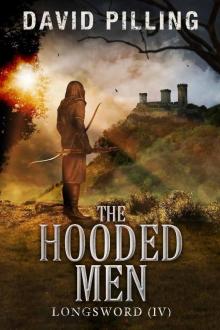 The Hooded Men
The Hooded Men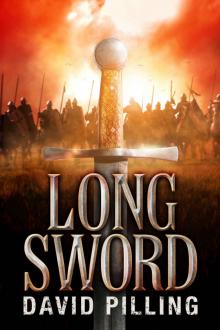 Longsword
Longsword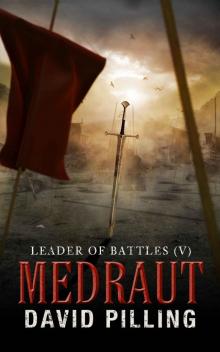 Medraut
Medraut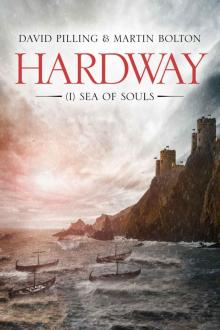 Hardway
Hardway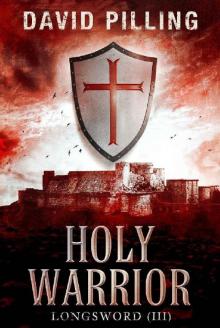 Holy Warrior
Holy Warrior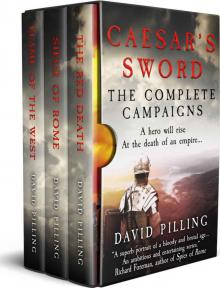 Caesar's Sword: The Complete Campaigns
Caesar's Sword: The Complete Campaigns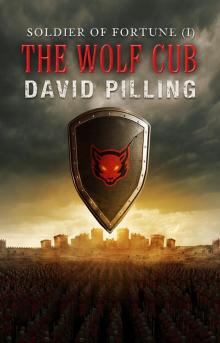 The Wolf Cub
The Wolf Cub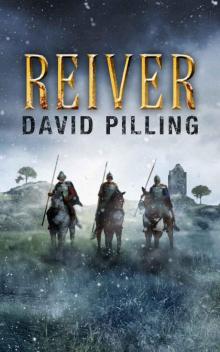 Reiver
Reiver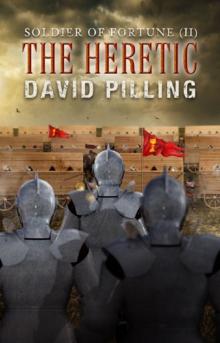 The Heretic
The Heretic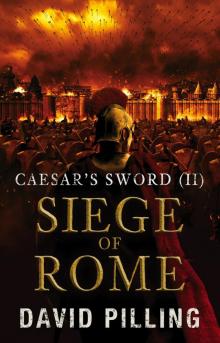 Siege of Rome
Siege of Rome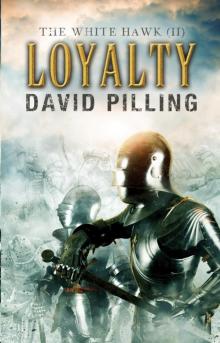 Loyalty
Loyalty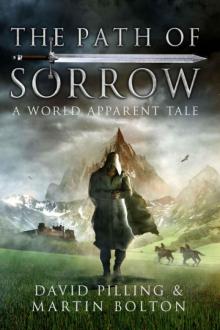 The Path of Sorrow
The Path of Sorrow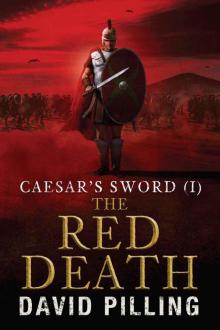 Caesar's Sword (I): The Red Death
Caesar's Sword (I): The Red Death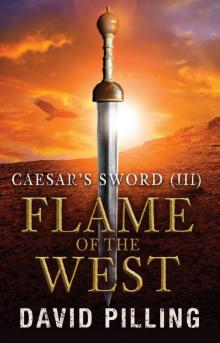 Flame of the West
Flame of the West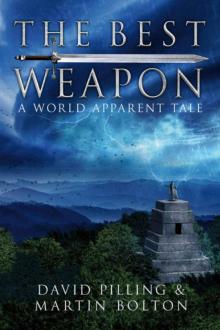 The Best Weapon
The Best Weapon Sacrifice
Sacrifice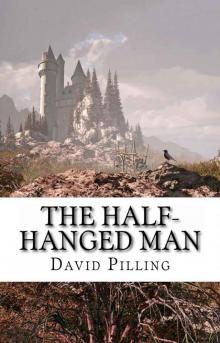 The Half-Hanged Man
The Half-Hanged Man